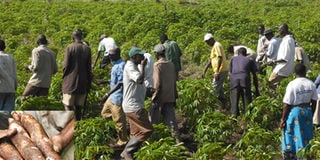Prime
Karimojong embrace farming to fight poverty

Farmers weeding a cassava plantation in alekilek village in Moroto District. it is hoped that the crop, will put food on more tables. PHOTO BY STEVEN ARIONG.
What you need to know:
Despite having the most fertile land in the country, according to National Agricultural Research Organisation, poverty is still rampant in Karamoja
Monica Apio, 21, a Senior Six dropout from Abim District, has embarked on commercial farming to raise school fees to resume her studies.
Apio, who was offering Biology, Chemistry and Agriculture at Advanced Level last year, dropped out of school because of lack of fees.
“I have fought off boys who want to lure me into marriage. I am happy my parents have supported me with an acre of land at home on which I grow maize to support my education,’’ she told Daily Monitor at the weekend.
Apio, a resident of Atunga Sub-county in Abim District, is one of the locals who have embraced commercial farming alongside pastoralism to boost their household income.
Ms Charity Almona-Albina, 33, a resident of Kiru Town Council, said her yields have improved since she started farming using modern methods.
Mr Ali Opio, another resident, said residents of Abim should take advantage of the fertile soils to improve their livelihoods.
“The government should scale up security because our gardens are fertile but they are located far away from our homesteads. Cattle rustlers destroy our crops,” he added.
Ms Grace Adongo, 35, a resident of Rwamuge Town Council, said they have also started bee farming after attending several trainings.
“We have the potential to be the lead supplier of honey in the country,’’ Ms Adongo, said.
She asked the government to give those tractors and farm inputs, especially drought-resistant seeds and fertilisers to enhance their productivity.
Despite having the most fertile land in the country, according to National Agricultural Research Organisation, poverty is still rampant in Karamoja.
The area is Uganda’s poorest sub-region with an estimated income poverty of 66 percent, food poverty of 75 percent and multidimensional poverty of 85 percent, according to Uganda Bureau of Statistics findings released in 2022.
Last year, the sub-region experienced severe food shortage, leading to several deaths.
Leaders attributed the misfortune to increase in cattle rustling and massive crop failure as a result of drought.
The locals have since asked government to put in place more irrigation schemes in Karamoja.
The locals in Abim District recently received training on commercial farming from Princewills Investments Ltd, a private investor promoting agriculture in Karamoja Sub-region and northern Uganda.
“They trained us on different methods of farming and land conservation. I have learnt that seed selection is very important,’’ Mr Johnson Ogwal, a resident, said
The State minister for Trade and Cooperatives, Mr Fredrick Ngobi Gume, said the government is supporting a series of activities geared towards supporting formation of cooperative groups to fight poverty in Karamoja Sub-region.




